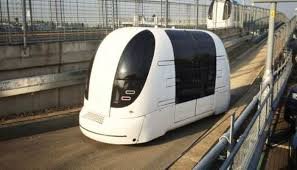In a city where time is of the essence and every minute counts, Mumbai’s Bandra-Kurla Complex (BKC) stands as a symbol of the perpetual hustle and bustle that characterizes urban life. For many years, people travelling along this important road have struggled with too much traffic and things not working well. Their everyday schedules are often disrupted by long traffic jams and taking a long time to get where they need to go.
However, amidst the noise of honking horns and bustling crowds, a glimmer of hope emerges—a visionary solution poised to revolutionize Mumbai’s transportation landscape. Recent reports unveil plans for the introduction of driverless pod taxis, a cutting-edge innovation set to ply the route between Bandra and Kurla, heralding a new era of mobility and convenience for the city’s denizens.
Read More:- Madhya Pradesh to soon have two new airports!
Endorsed by the Mumbai Metropolitan Region Development Authority (MMRDA), the proposal represents a bold step towards alleviating the chronic congestion that has long plagued the arteries of BKC. This groundbreaking initiative seeks to redefine the paradigm of urban transportation, offering a glimpse into a future where efficiency, sustainability, and convenience converge seamlessly.
At the heart of this transformative endeavour lies a commitment to leveraging advanced technology to address age-old challenges. The driverless pod taxis, equipped with state-of-the-art navigation systems and autonomous capabilities, epitomize the vanguard of innovation in urban mobility. With a capacity to ferry six passengers per pod, these sleek, futuristic vehicles are poised to traverse the designated 8.8 km route with unparalleled speed and efficiency, promising a commute devoid of the usual frustrations and delays.
Strategically positioned stops totalling an impressive 38 will ensure seamless connectivity between the Bandra and Kurla railway stations and key destinations within BKC, facilitating swift and hassle-free intermodal transfers for commuters. Moreover, the project’s implementation hinges on a robust public-private partnership model, underscoring the collaborative spirit driving Mumbai’s march towards a smarter, more sustainable future.
While the initial estimates pegged the cost at INR 50 crore per kilometre in 2017, the evolving scope and scale of the endeavour have necessitated a revision of the projected expenditure, which now stands at a staggering INR 1,018 crores. Despite the formidable financial investment, the long-term benefits of the project—including reduced congestion, enhanced connectivity, and improved air quality—are poised to yield dividends for Mumbai’s residents and businesses alike.

Beyond merely alleviating traffic woes, the imminent launch of driverless pod taxis holds broader implications for the city’s socioeconomic landscape. By catalyzing the development of cutting-edge infrastructure and fostering innovation-driven growth, this ambitious undertaking has the potential to position Mumbai as a global leader in urban mobility and smart city initiatives.
As Mumbai braces itself for the advent of driverless pod taxis, anticipation mounts regarding the transformative impact of this pioneering initiative. With its potential to redefine the contours of urban commuting, foster economic prosperity, and mitigate environmental degradation, the project stands as a testament to Mumbai’s unwavering commitment to embracing the future, one innovative leap at a time.
Disclaimer: The above information is a result of research and Axpert Media is not responsible for errors in the same.


